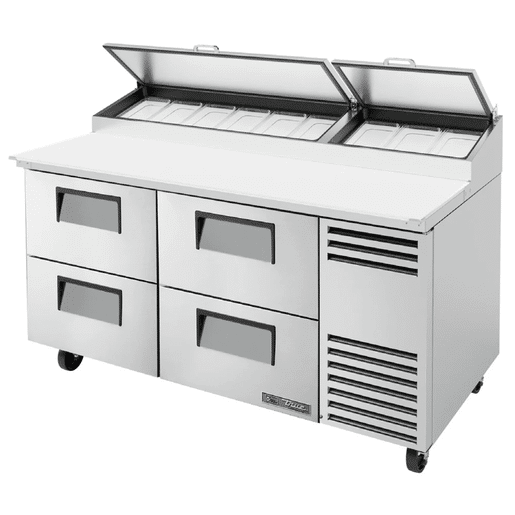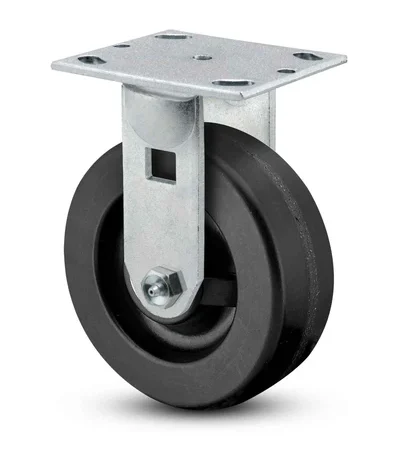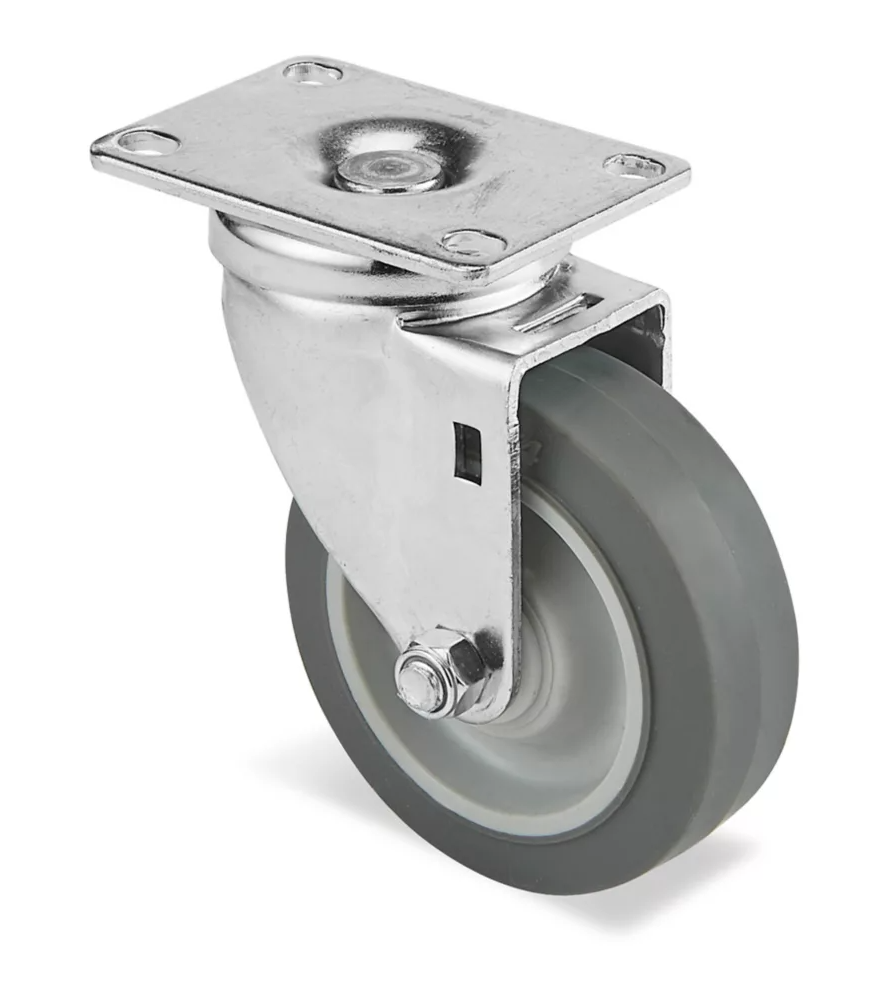Commercial Kitchen Wheel Casters: Types, Uses & Buying Guide

The wheel caster is one of the most necessary yet overlooked pieces of commercial restaurant kitchen equipment.
Casters, of which there are many varieties, play an important role in kitchen mobility, kitchen functionality, prep and line station setup, and, most importantly, food safety, kitchen sanitation, and cleanliness.
What Are Casters?
So, what are casters, and how do they differ from wheels? While a caster does include a single wheel, it also includes a bracket that allows you to attach the wheel to a table leg or piece of kitchen equipment. The practical upside to this is that it can make heavy or bulky equipment like commercial kitchen prep tables, service carts, food trolleys, cooling racks, portable ovens, or catering appliances easy to move.
While wheels that spin in one direction on an axis have been around for thousands of years, casters that can rotate 360°, or “cast” a circle, have only been used for about a century and a half. In addition to their myriad uses in the kitchen, casters have been utilized to add mobility to chairs, suitcases, shelves, pianos, dumpsters, and hundreds of other items we use every day.
Food Service Casters
High-Temperature Resistant Casters
A wide range of wheel caster types have been designed specifically for use in the food industry. If your casters are located near industrial ovens, grills, “Salamander” broilers, pizza ovens, autoclaves, or open flames, they must be built from material that can withstand high temperatures. Casters with fiberglass wheels can withstand temperatures up to 475° – 525°F intermittently. Similarly, casters with nylon wheels can be used in temperature conditions ranging from -40°F to 475°F.
Sanitary Casters
Another critical factor to consider when choosing wheel casters for your kitchen is hygiene. The last thing you want is to track bacteria around the kitchen when you move your equipment! Casters designed for sanitary use include self-draining surfaces, tight sleeves to cover the spindle threads, and completely enclosed mechanisms. Wheels made from materials like neoprene rubber and phenolic resin are also resistant to cooking oils, grease, and mild acids. In contrast, wheels made of polyolefin are well-suited for wet and corrosive environments. Each of these wheel caster designs is perfectly tailored to suit different areas of commercial kitchens.
Heavy Duty Casters
Moving equipment around an industrial kitchen often means rolling hundreds of pounds over bumpy, uneven, slick, rough, or wet surfaces. For caterers, this list can even include carpeted, grassy, gravel, or concrete surfaces. Ensure that the wheels on your casters are made from materials that will suit the environments in which they will be used.
Rubber wheels are an excellent choice for quiet performance on softer floors. Polyurethane wheels can handle heavy loads, are highly durable, and are well-suited for uneven, bumpy, slick, soft, and rough terrains. Stainless steel caster wheels are a good option for very wet environments where rusting and bacterial growth are a high concern.
Here is the bottom line: Since casters are the literal foundations of your kitchen equipment, ensuring you have wheels that are made to handle everything you put them through is key to keeping your kitchen running smoothly. Choosing the best casters may not be the cheapest option, but they will save you time and money in the long run!
Types of Casters

Fixed Casters
A fixed caster, or rigid caster, is defined by the wheel being mounted in a fixed position. Fixed casters can easily roll your equipment back and forth without worrying about steering. The fixed wheels don’t turn corners well, but that lack of maneuverability means that the casters are much sturdier and can handle heavier loads.
Fixed casters are best suited for equipment that only needs to be moved back and forth or side-to-side. Often, this means prep tables or other workspace equipment that only needs to be pulled out for cleaning.

Swivel Casters
The wheel on a swivel caster is attached via a central rod, which allows it to spin in a full 360° circle. Any equipment mounted on swivel casters can be easily turned, rotated, and maneuvered. Because the wheels take both straight and perpendicular pressures, they can’t hold the heavier loads that fixed casters can. They can also be more challenging to steer and are best for shorter distances.
Swivel casters are necessary for food trolleys, service carts, and catering equipment, which must be taken between rooms and environments and steered around tables and corners.

Stem Casters
Stem casters are designed to attach to a piece of furniture with a vertical stem, or rod, extending above the wheel. The stem is either inserted into a hole pre-fitted with threads or with a bracket to the side of your equipment. Both fixed-stem casters and swivel-stem casters are widely available.
These casters are best suited for light kitchen equipment and loads. They are perfect for service carts and furniture. They are also easy to replace, which makes them an ideal choice for use on rougher surfaces and over longer distances.

Plate Mounted/Flat Plate Casters
Casters with plate mounts above the wheels attach by bolting the plate directly to a flat surface. Because the weight of the furniture or appliance is spread out, plate-mounted casters are sturdier and can carry heavier loads than stem casters. Additionally, they do not extend past the sides of the equipment they are mounted beneath and can be pushed flush against a wall.
Plate-mounted casters offer the greatest mobility and stability but are more difficult to replace. They are perfect for ovens and other heavy equipment that don’t need to move as much as catering equipment or trolleys.
Wheel Caster Buying Guide
Factors Influencing Caster Selection
When choosing your casters, ensure you know how much weight they need to bear. Light-duty casters are rated for up to 500 lbs., medium-duty casters can hold between 500 and 2,000 lbs., and heavy-duty casters are designed for loads exceeding 2,000 lbs.
A Helpful Hint: the listed load-bearing capacity is per caster, not per set. When deciding which casters to buy, divide the total weight by four. This will tell you how much each caster will need to be able to hold.
Before purchasing, you must also know what flooring conditions your casters will be rolling on. If the caster’s wheel material is incompatible with your floor, you risk damaging the wheels or floor or leaving unsightly marks behind you. The wheels on casters are usually made of hard materials like steel or cast iron, but most are coated with softer treads like rubber or nylon. Both materials should factor into your decision.
- Hardwood: Opt for non-marking solid polyurethane or neoprene wheel tread. They are soft enough not to damage the floors and won’t leave marks or debris behind.
- Concrete: Polyurethane tread is highly resistant to severe damage and is a good choice for rough outdoor concrete. Nylon wheels are highly durable and will cause minimal damage to indoor concrete floors.
- Tile: Tile floors are easily damaged by hard wheels and easily marked up by soft rubber wheels. Therefore, your best bet is to find casters with wheels specifically designed for use on tile flooring, such as chemical-resistant thermoplastic polyurethane.
- Gravel/Grass: Since durability is of utmost importance on gravel, but there is no risk of damaging the flooring, stainless steel caster wheels are ideal. They are also great for wet environments, which would cause rust on cast iron casters.
Wheel Size and Width
There is a wide range of design choices that will affect the usability and durability of your casters. Casters with larger wheels (4 to 8-inch wheel diameters) will be easier to push, especially on softer or carpeted flooring. Wheels with smaller diameters (3-inch wheel diameter or smaller) are better suited for harder flooring. Casters with a wider wheel width will have an increased load capacity.
You’ll also want to consider your tread materials’ shock-absorbing and rebound-resisting properties and design. Subjecting your equipment to rough bumps and jolts can cause damage. Smooth steering also helps keep your staff safe.
How to Choose the Right Caster
When preparing to purchase casters, it is a good idea to understand your specific needs and go in with a plan. Ask yourself the following:
- What environments and flooring will my casters need to traverse?
- What equipment in my kitchen will need casters?
- How much weight will my casters need to bear?
- Will my equipment need to turn corners, rotate, or maneuver easily, or will they only move back and forth?
Will My Casters Need Brakes?
Dangerous cooking equipment like mixers, ovens, autoclaves, and even prep tables, which must stay still when in use, should always have casters with a top lock brake to ensure the user’s and kitchen staff’s safety.
Commercial Caster Maintenance and Care
Follow these steps to ensure the longest lifespan possible for your industrial casters:
- Any food or residue should be regularly wiped off the kitchen equipment caster wheels and cleaned from the wheel casings as part of your kitchen’s regular cleaning routine.
- Properly lubricating your caster wheels and fittings with spray lubricant every six months will ensure they continue rolling smoothly and evenly.
- Check the brackets, bolts, screws, and fasteners on each caster every month or two. The last thing you want is for your caster to break or fall off and cause damage to your expensive commercial cooking equipment.
- Finding replacement parts should not be difficult if you remember your caster suppliers, though it is often easier to purchase replacement casters.
- Caster wheels with softer treads like rubber must be checked regularly. The tread will wear away quickly, especially if subjected to rough terrains like gravel or concrete.
- When the wheel tread starts to wear down, replace your wheel immediately.
Keep Your Kitchen Running Smoothly with The Right Commercial Casters
Casters are deceptively simple yet have enormous implications for your commercial kitchen. The most important thing to remember is that poor-quality casters and improper maintenance can result in disastrous accidents and thousands of dollars in damages. Having casters with wheels suited for your floors, can bear the weight of your equipment, and can easily maneuver wherever you need them to go will keep your kitchen running at the highest industry standards!
